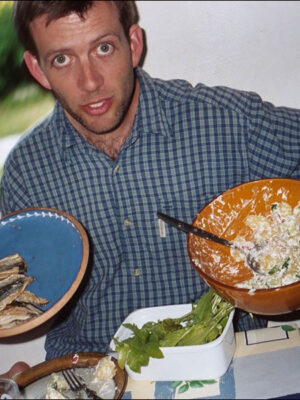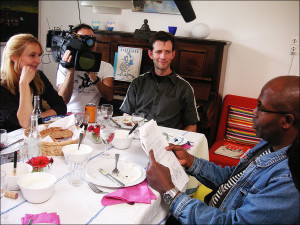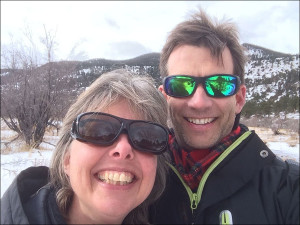Jack Jackson
Freelance Journalist

Degree(s): MA '93
When Jack Jackson, MA ’93, landed in Denmark in 1995 with the intent of continuing a freelance journalism career in a country he’d never visited, he was out on a major limb. He knew one person, a handful of Danish words and that, somehow, he would persevere and find success.
Jackson’s bold move to Denmark reflects his tendency to wander off the beaten path when he senses adventure is leading him in a new direction. Embracing new opportunities led Jackson to bring world-renowned musicians to Columbia for his master’s thesis, start a freelancing career and eventually immigrate to an unexplored country. Jackson doesn’t look at changed circumstances as roadblocks to his life path, but rather as necessary turning points to find the next adventure.
Missouri Made
Jackson first diverged off the beaten path at Missouri. With an undergraduate degree in technical journalism from Colorado State University, he arrived at Missouri School of Journalism to pursue a master’s degree. Jackson assumed his journalism interests would eventually lead him to a newsroom or possibly a classroom to teach aspiring journalists. This vision slowly started to change during a class with Professor Steve Weinberg, who introduced him to the world of freelance journalism. The freedom and independence of this type of reporting enticed Jackson to discuss freelancing with Weinberg extensively outside of class.
“I really felt like I could freelance from his encouragement,” Jackson says.
With Weinberg’s encouragement, Jackson began to consider career options beyond the newsroom. He loved the idea of selecting his own stories. The freelancing seed had been planted.
Jackson began work on his thesis project. His topic, rock music journalism, was a unique master’s thesis that incorporated his passion for music with his love for journalism. With help from Professor Betty Winfield, he organized a multiday conference in Columbia that brought in guest speakers like Chuck Berry, Ice-T and Gil Scot-Heron. Writers and editors from Rolling Stone, the Village Voice and cultural magazines overseas also came to speak, and at night the artists put on concerts at the Blue Note.
“I was star-struck the whole time,” Jackson recalls. “These people who were kind of my heroes at the time, these rock critics and writers were all there.”
His unconventional thesis experience taught him not to impose self-limitations or confine himself to the norm.
From Missouri to New Places
After earning his master’s degree, Jackson devoted a year to worldwide travel. He expected to find adventure and beauty in the magnificent landscapes of New Zealand, but he also found a Danish woman named Anette, who would eventually alter the course of his life. They fell in love, completed a backpacking journey together and reluctantly parted ways when they both returned to their home countries.
Jackson’s return to the United States came with no real career plan. Freelancing once again emerged as a possibility after a conversation with Missouri colleague Francesca Donlan, MA ’93, who shared her success with full-time freelancing. Meanwhile, another Missouri journalism friend, David Johnson, BJ ’92, offered Jackson the chance to sublease his apartment in New Orleans. Prompted only by this housing offer, Jackson’s free spirit and sense of adventure took over. He headed south without a job prospect.
In New Orleans Jackson waited tables and tried to freelance in his spare time in order to pay the rent. He found that it was extremely exhausting to juggle both trays of food and a new journalism career.
It was the 1994 movie Pulp Fiction that changed Jackson’s path. The film’s main message, about the short, unpredictable nature of life, resonated with him. He realized that waiting tables was actually a roadblock preventing him from pursuing his dream.
“I went into the job I had waiting tables, and I said ‘I quit!'” Jackson says. “So that was it. I went to see Pulp Fiction, and when I came out, I was a freelancer.”
Once he decided to chase down his passion and devote himself to freelancing full time, the transition proved easier than he anticipated. Johnson, an editor at an arts and culture magazine in the city, generously gave him relevant story ideas and helped him make the right connections at the New Orleans Times Picayune, New Orleans City Business and other publications. As Jackson fully invested himself into freelancing, he reaped the benefits in bylines and paychecks.
Jackson enjoyed exploring both the city of New Orleans and the world of freelance journalism for a year. While his career was thriving, his heartstrings were tugging him to the Danish woman halfway around the world. Anette had just started occupational therapy school in Denmark and needed to stay there to complete her degree. Jackson realized he was overlooking one of the greatest advantages of his newfound career: It didn’t require him to live in a specific city.
“I thought, ‘Well I can freelance here, so I guess I can do this anywhere,'” Jackson says.
Once again, Jackson found himself diverging from the beaten path. Jackson’s open mind and appetite for adventure swiftly secured his decision. He packed up his apartment, drove his belongings back to his parents’ house in Colorado and boarded a one-way flight to Denmark.

Stranger in a Strange Land
Jackson landed in Denmark with a suitcase full of clothes, a computer, a mountain bike and a cast iron skillet. He knew enough Danish to say, “I’m sorry, I don’t speak Danish. Could you say it in English?”
Despite his limited language proficiency, Jackson intended to continue his freelancing career. He lived in Aarhus, a harbor town of fewer than 200,000 people where Anette attended school. Jackson somewhat assumed his English-speaking skills would suffice in a country whose population is familiar with three to four languages. Despite Aarhus being the second-largest city in Denmark, most of its citizens were not as familiar with English as he had anticipated.
“I was basically illiterate; I couldn’t read any signs,” Jackson says. “It was hard to be a stringer for foreign media since I was not in the capital but in this provincial city.
Jackson’s move to Denmark tested his ability to adapt to new environments like never before. Over the course of one summer, he moved to a new country, got married to a woman he had only travelled with, started a freelancing business and began to learn a new language.
Jackson remembers walking out of a public library without properly checking out his books, which set off a security alarm. A librarian yelled at him and without knowing how to communicate, he couldn’t apologize and resolve the situation. Moments like this showed him that, despite his two degrees in journalism, he now lived in a world where even simple communication proved challenging. These frustrations propelled him to moments of self-doubt and concern that he could never settle into this new community. He persevered with faith that he had merely encountered a large, yet surmountable obstacle.
Jackson’s initial freelancing jobs were few and far between. He sold a handful of articles to his New Orleans contacts and produced a couple of travel pieces for American media. It was difficult to make ends meet, especially with his wife still in school.
With time, the pieces of his new life started to come together. Jackson began attending a Danish language school filled with immigrants and refugees from around the world. He met people from places like Somalia, Lebanon and Vietnam who all understood the struggle of being a stranger in a strange land.
During this time, he met another American journalist who introduced him to freelance corporate journalism. Initially he was skeptical about writing for a corporation, as it seemed to counter the watchdog nature of his previous work. Still, he was interested, and the American journalist connected him with possible employers.
“I could use my skills as a journalist to work for a company and write great stories for their customers or their employees,” Jackson says. “I was still using my skills as a journalist. I was just wearing a different hat.”
He sold his first piece to a Swedish company at a more reasonable price than the other stories he had produced while in Denmark. His freelancing business began to take off.
Bridging the Gap Between Traditional and Corporate Journalism
Throughout the next 15 years, Jackson produced pieces for both corporations and traditional journalism outlets in Denmark and the United States. To him, these realms of communications only differed in that corporate journalism sometimes involves a subtly persuasive message.
Jackson thought other non-journalist weakened their message’s impact because they superfluously focused on the products’ benefits.
“As a journalist, you’re almost like a secret weapon in a corporation,” Jackson says. “You’ve learned how to tell a story that has a beginning, middle and end and has momentum to carry a reader, listener or viewer through and keeps them reading, watching or listening.”
One of his favorite stories centered on a pair of twins and was published in a Danish pharmaceutical company’s employee magazine. One of the boys was a haemophiliac who regularly took medicine produced by the company to control his blood clotting. Jackson wrote about the boys’ relationship and how the medicine positively impacted their lives.
“I was really proud of that story,” Jackson says. “It gave me a big picture view to see how I could use my journalism storytelling for this huge corporation that helped put a face on their end customer.”

Other journalistic opportunities piqued Jackson’s interest. The Danish School of Journalism hired him to work with students in a Europe Around the World class, fulfilling his original reason for attending the Missouri School of Journalism. Each year, students study journalism at the school, then branch out to various cities around Europe, after which they return to the school and produce a magazine written in English. Jackson edited this magazine and guided the students through the process. Most of his students were around the same age as him, if not older.
Jackson loves that freelancing allowed him to fuse his passions with his profession. He supports sustainability and environmental conservation and at one time was an editor and writer for a Danish wind power trade magazine. Denmark has been a world leader in developing wind power technology, and this opportunity allowed him to learn about and contribute to this industry. Years before Jackson became a podcast fanatic, he discovered his written journalistic skills could also apply to audio and visual stories. He dabbled in radio and video journalism when he made radio features for the Danish National Broadcasting organization and completed a radio diary about a Danish soldier who fought in Iraq.
Throughout each of these projects, Jackson’s freelancing business was his only method of support. When the global recession hit in 2008, his freelance assignments started to dry up. With Anette and three children to support, Jackson once again faced an obstacle to overcome. This time it would result in reinventing his career.
Jackson learned that Grundfos, the world’s largest pump manufacturer, was seeking a journalist to work in-house for their newsletter and website. He applied and was offered the position. Jackson initially wrestled with the decision of whether to accept; for the past 15 years, he had flourished in the independence, spontaneity and fun of freelance journalism. Ultimately, he decided to give the cubicle, 9-to-5 lifestyle a try.
Going Full Time
In 2010, Jackson started his new job as a communications specialist at Grundfos. It was a bit of a culture shock at first but after a few weeks, he wondered why he had never seriously considered working directly for a corporation. Once again, he found his background in journalism prepared him for his role in full-time corporate communications.
“When I came in, I saw articles or brochures that were all hype-y. ‘Look at this great new product, we are so great, this is the best ever, if you’re looking for the best blah blah blah,'” Jackson says. “I looked at it like ‘can’t we just tell the story based on the real facts?’ We don’t need to base this on ourselves and add flowery language, let’s tell the story as it really is!”
Jackson’s background in journalism also helped him find compelling stories related to a product that might seem boring on the surface. While it might not be every wordsmith’s dream to write stories about industrial pumps, Jackson didn’t view the subject matter as a hindrance to his craft.
“There’s always going to be interesting stories once you go behind the curtain. Start having a look and snoop around back there,” Jackson says. “Really, I was writing stories about people. It’s not so much about the product, it’s about people.”
While at Grundfos, Jackson started a global newsletter that reached around 100,000 people in seven different languages. He also produced a film project that won six international awards.
The company’s values aligned with Jackson’s own beliefs about sustainable products. He happily promotes the researchers’ work and discoveries in electricity conservation because he believes that environmental future of the planet depends on men and women like these.
Life Outside the Lines
Outside of his work as a corporate journalist, Jackson leads a vibrant life. Although his life has been full of inconsistencies and new experiences, his passion for music has remained a foundational part of his character. He plays piano in a Latin band and has been teaching himself various styles of guitar. In addition, he and Anette bring their three kids back to the United States often to visit family in Colorado. His children speak both Danish and English, and it’s a household game to try and finish each sentence in the same language in which it was started.
Although he never envisioned himself starting a career and raising a family in another country, Jackson says his habit of wandering off the beaten path has allowed him to lead a very fulfilling life.
“One thing I learned at Missouri is how you can keep learning new things, but to do so, you have to pursue them yourself,” he says.

A native of Omaha, Nebraska, Colette Rector, BJ ’16, studied journalism and Spanish at the University of Missouri. She held several internships throughout her undergraduate tenure, including stints with Southwest Airlines, the MU Cambio Center and a digital marketing agency in Omaha. These experiences have allowed her to sharpen her skills in many disciplines of strategic communication including writing, design, public relations and social media. Rector hopes to pursue a career in health communications at a hospital or government agency.
Updated: May 25, 2016